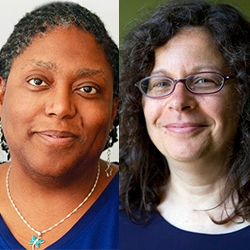

Search Results: question
-
Reveal what's in your heart before asking a question to help build trust, especially if you're in an authority figure. Otherwise, your question may sound like a demand, blame, trap, intrusion or accusation, and it may elicit a defensive response. If you get a "question" like that, give them empathy. Read on for reflection questions to see how our revealing and our withholding impacts our relationships with others and with ourselves.
-
-
-
What's my intention? What needs am I trying to meet? What do I want the other person to know or understand? How can I say it in a way they are most likely to hear? These are four questions we can use in preparation for an important conversation. Read on for more on this, plus four accompanying practices.
-
-
- Witness these two visionaries engage with love, openness, and curiosity
- Explore open questions and curiosities you have about NVC
- Help support the ongoing sustainability of NVC Academy
- Expand your thinking within NVC and its relevance to our times
-
Some people in the NVC community consider the words "privilege" and "power" triggering and/or evaluative. From this perspective, how can the concepts of "privilege" and "power" be considered part of the NVC teaching? This writing piece examines the power and privilege debate. It also discusses what the author sees as Marshall Rosenberg and Gandhi's stance on the subject...
-
Could our "need for autonomy" be getting in the way of "partnership consciousness" (as NVC is sometimes called). Could "autonomy" also block healthy relationships with not only ourselves and with others, but also with the planet? This article invites us to consider how "autonomy" may colour our NVC practice at the peril of our critical values. Values such as our care for impact, shared responsibility, interdependence, compassion, consideration, and more...
-
-
What could be, more often than not, overlooked when we think about or represent NVC or Marshall Rosenberg's work? This article busts some commonly held ideas and approaches to NVC. It challenges us to widen the lens of what it really means to be "life-serving", or speaking and hearing the "language of life". And it also speaks to how thinking can deepen feeling and relatedness...
-
Getting "feel good" empathy can become an addiction. Even to the point of seeing people who don't offer empathy as "not being NVC". Rachelle urges us to notice how this view of NVC can be seductive, and even dangerous. In this article, she explains how we can expand our compassionate awareness when we go beyond equating NVC with harmony and empathy. She asks us to become more open to noticing others' experiences even if it challenges our personal and collective belief systems -- and especially when it upsets us to consider it.
-
When does identifying our or others' needs become a coping mechanism that hides the real problems that go unaddressed, and thereby reinforcing problems? This article zooms out to take a look at how dealing with our needs in the absence of the larger picture can inadvertertly support unhealthy ways of operating, rather than become a healthy solution. It asks us to see what could be hidden -- both on the personal and societal levels.
-
So often we're habituated to associate a “why” question with being reproached, blamed or shamed – and so defensiveness arises. However, in order to maintain a flow of understanding and collaboration, we need to hear and say the “why” while finding other ways to ask for it. Here we look at how to ask questions that bring each of us vital information that can open up discovery and learning, for our mutual benefit.
-
Some questions will take you deeper and deeper to universal human needs when you toggle between them. Questions like “What do I need?”, “If I had that, then what would I have?”, and “If I had that, what would that give me?”
-
Conflict is a normal and natural part of life. To varying degrees, it happens whenever two or more people consistently spend time together. Resolving conflict effectively and peacefully, in a way in which all parties feel respected and valued, does not feel natural for those of us who grew up with punitive, adversarial, or avoidant approaches to conflict. Eric offers some tips for approaching conflict.
-
Total inclusion is impossible: inclusion of all can often lead to exclusion of those who can't bear the behaviors of some. Many groups flounder and disintegrate because of too much inclusion. Limited resources and capacities may make it necessary to exclude. Keeping more coherent shared values and strategies may be another reason to place membership conditions so that what appears to be exclusion may give movements a chance to expand.
-
When deciding if someone crossed your boundaries and how to respond, you may get conflicting opinions on it. These opinions can be coarse attempts to manage life with rules about what should(n’t) happen. Instead, so that you can find where you want to invest your energy, ask yourself questions that reveal what for you is truly in integrity, nourishing, connects to your heart, and deepens self understanding. Read on for examples.
-
Effective and connected dialogue requires significant self-awareness, mindfulness, and skill. You can focus on any of these six areas that most often escape your awareness: anchoring and staying grounded; boundaries; thoughts and beliefs; stuckness or attachment; feelings and needs; and requests. Read on for a list of questions to help you focus on how to do that.
-
Sometimes we want to avoid placing our love and trust in someone, to protect our hearts and our life energies. And so there are deeper questions that we can use to check whether we're in relationship with someone who doesn't have capacity to be in relationship with us (eg. “Do I have a sense of mattering in this relationship?”). Read on for more questions we use to assess our empathy and efforts in relationships.
-
While we can’t control other’s behavior, we can choose how we show up. With forethought and care, we can approach interactions with more clarity, love, and skill. Read on for practices that include: Choose wise attention, ask better questions, practice deep listening, structure the conversation, know your limits, speak your truth, share your personal stories, be present and recall permanence.
Quick Links

Stay in Touch!
We value your privacy, won't share your email address and you can easily unsubscribe any time.
















